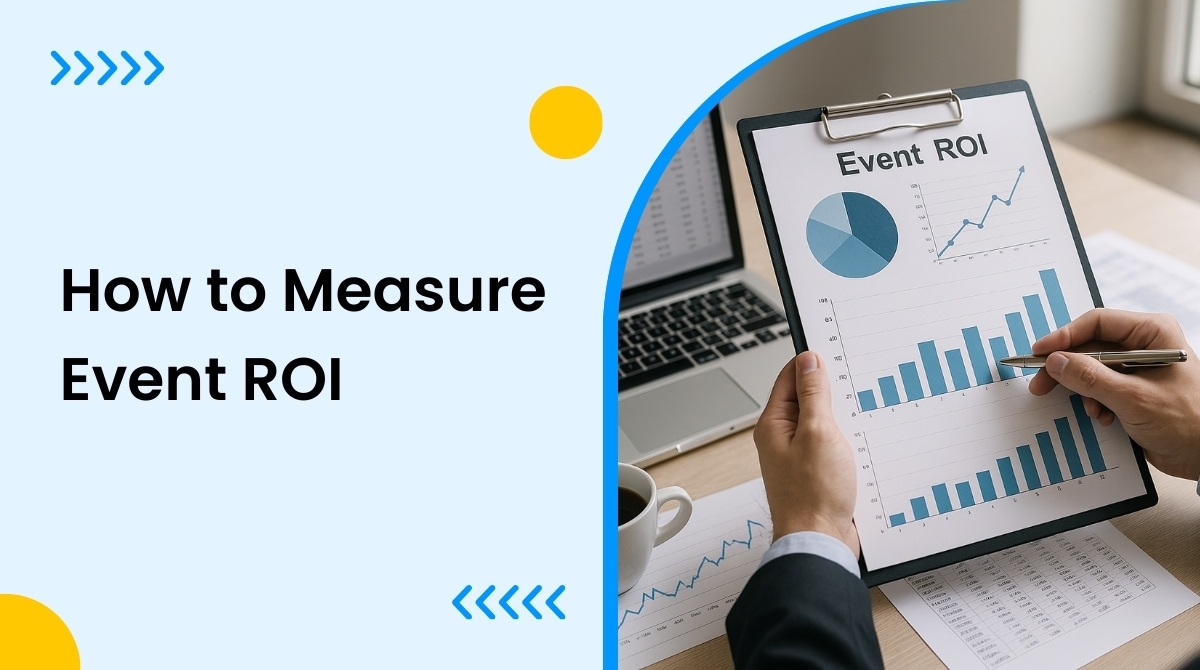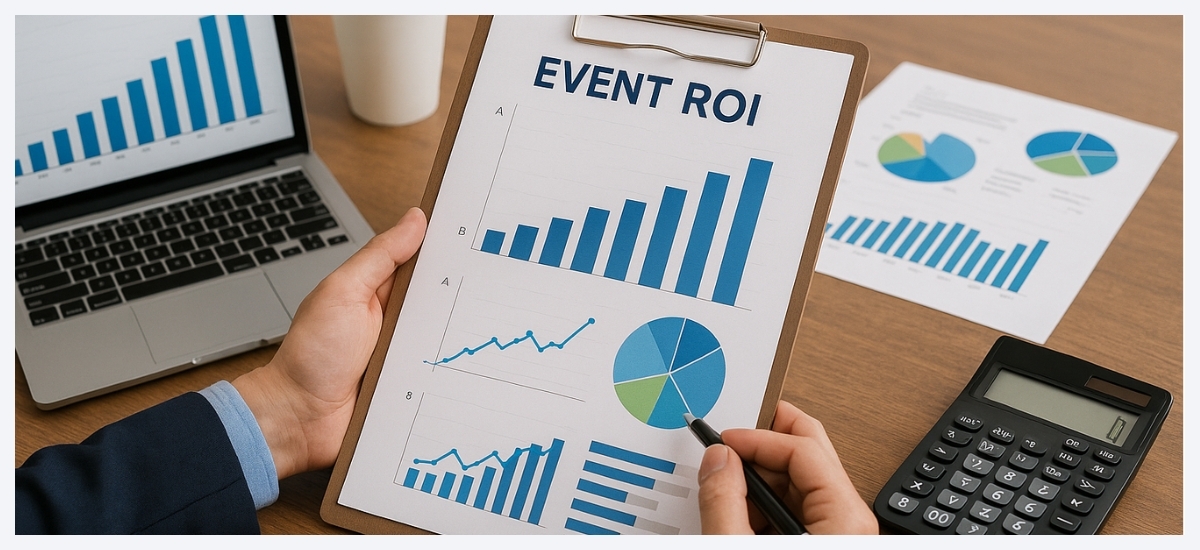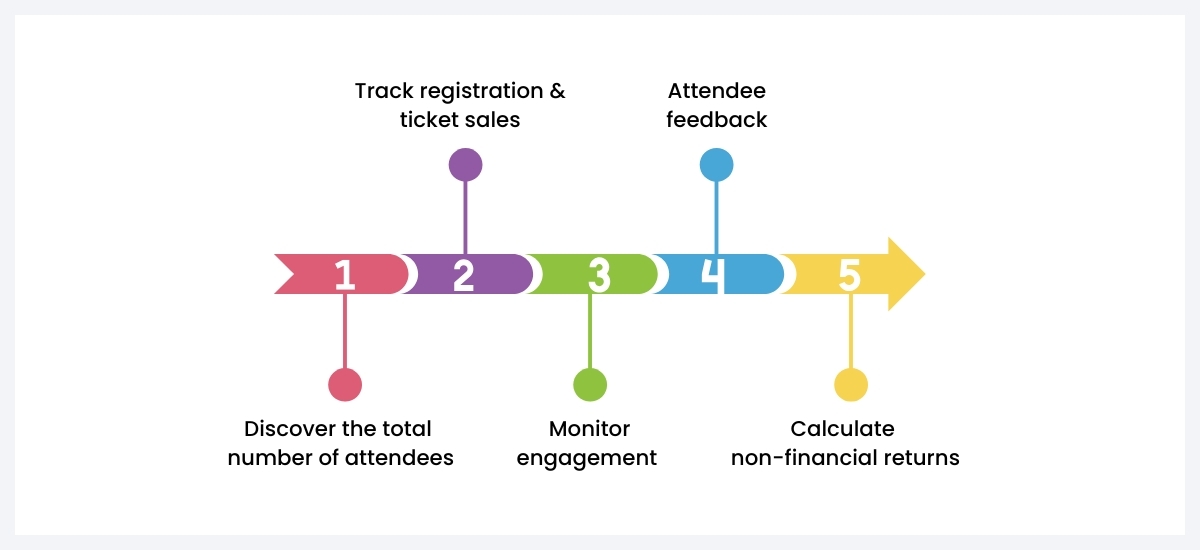- « Previous blog
-
Events
-
Nov 26, 2025
-
Dec 5, 2025
-
4882
-
0
- Next blog »
Measuring event ROI in 2025 extends beyond ticket sales, as event management is now primarily driven by data.

Every event planner aims to achieve the best results for their events. However, most of them struggle to track the accurate event ROI. As a result, they can not clearly determine if their events are doing well or if the investments they are making in events are adding value to the business. No matter which types of events you organize, understanding your event ROI is crucial to get a clear picture of your event performance. Though the process is complicated, with advanced analytics tools, event automation methods, and audience behavior tracking facility on the it has become easier than ever.
In this details event ROI measure guide, you will learn about the concept, the factors that influence event ROI, and the method to measure it. Let's get started.
What is event ROI?
The concept of event ROI is not limited to only the number of tickets you sold and the money you made out of it. It tells you if the investments you make in an event are worth it by comparing its overall revenue with the associated costs.
Apart from your ticket sales, your event ROI covers the following things:
- Brand awareness: Have you been successful in making your brand familiar to a large number of people through the event?
- Market insights: Has the event helped you understand marketing trends or customer interests?
- Customer engagement: Did your event help you build a strong relationship with your customers?
- Lead generation: How many potential customers were identified as qualified leads in your event?
Factors that influence event ROI
Certain factors directly influence your event ROI that include your target audiences, marketing strategy etc. Let us take a closer look at these factors:
- Event objective: Your event ROI highly relies on the goal you want to achieve through your event. For example, the main purpose of your event might be increasing ticketing sales, boosting conversions, promoting products, community growth, or networking.
- Target audience: You must have a clear idea of your target audience and provide the type of event content that they are interested in. This helps increase conversion and engagement significantly.
- Event Experience: The type of experience you provide your attendees with throughout the event, before and after that also matters when it comes to measuring your event ROI. A smooth registration and ticketing process, along with effective marketing, networking opportunities, and event accessibility, always make a difference.
- Marketing strategy: Your event promotional strategy also plays a major role in determining your event ROI. The channels you use to promote your event, the amount of exposure it receives, etc, everything is covered.
- Expense management: This includes the overall cost of your event, such as event venue, speakers, tools, and more, that directly influence the final ROI.
- Tools and technology: Modern events are incomplete without the right tools and technology. The cost of all the specific tools you use affects your total ROI.
After understanding the factors that directly influence your event ROI, let us explore the key metrics to measure it.
What are the major metrics to measure for event ROI
Counting only the money that you invested and the revenue you earned is not enough to find out whether your event was worth it. You must identify the key performance indicators that show an accurate picture of your savings and engagement levels.

Here are the essential event ROI metrics:
- Time savings: Measure how much manual effort is saved with the help of the event tools you use.
- Cost savings: Remove all the unnecessary tools and services that you used to use before adopting automation, and compare the cost.
- Increase in sponsorship revenue: Find out sponsor insights and compare sponsorship revenue before and after adopting technology.
- Boost in registration: Carefully monitor your event registration numbers and do a before-and-after competitive study.
- Level of engagement: Check reports and analytics to find out the engagement level in your event.
How to measure event ROI?

The standardized formula for measuring ROI is:
ROI = (Return – Investment) / Investment × 100
- Return = total financial gain generated from the event
- Investment = total cost spent on hosting the event
Apart from that, the following areas need to be considered to measure event ROI.
1. Discover the total number of attendees
The first and most important step to measure event ROI is to generate the exact number of people who attend the meeting. You can find it out by tracking registration, ticket sales, no-shows, and last-minute check-ins. This gives you an idea about how many people are interested in your event.
2. Track registration & ticket sales
Track the number of registrations and ticket sales you made and compare with the total number of attendees to understand the impact of your marketing activities. In simple words, it shows how successful you were in attracting your target audiences to your event through marketing.
Tools like the Registration and Sell Tickets addon from WP Event Manager offer detailed reports on registration and ticket sales.
3. Monitor engagement
An event becomes successful when people not only attend, but also actively participate in it. That is why when you measure event ROI, you also need to examine how well your attendees were engaged with it. You can monitor your social media engagement, how many people responded to polls, Q&A sessions, participation in event activities etc.
4. Attendee feedback
Your attendee feedback is one of the most important aspects of event ROI that you can not miss. This helps you understand which section of your event got maximum engagement and which parts needed something more. Create a post-event feedback email for your attendees and ask them to fill it up. Check the response and measure your ROI based on that.
5. Calculate non-financial returns
Calculating event ROI is indeed a financial matter that requires mathematical calculation. To calculate the non-financial aspects of your event ROI, you need to take the broader aspect of it. It is not only about the revenue but also about the impact of your event on your brand or company in the long run. The reports of your attendee behavior on your event WordPress website along with session participants and post-event interaction, allow event organizers to build strong marketing strategies for the future.
Wrapping up
We hope that the above-mentioned event ROI measuring guide will be helpful for you to maximize your event ROI.
Frequently Asked Questions (FAQs)
1. What is event ROI?
The term event ROI or return on investment refers to the financial and non-financial value derived from an event compared to the total amount spent on organizing it. Here the value covers the amount of revenue generated, Leads, engagement, brand visibility, and more.
2. What is the basic formula for calculating the event ROI?
The basic formula of calculating event ROI is:
ROI = (Total Benefits - Total Costs) / Total Costs × 100
3. What are the innovative strategies to improve event ROI
Some of the most innovative strategies to improve event ROI include:
- AI powered personalization.
- AI based matchmaking for better networking.
- Data driven marketing decision.
- Dynamic event ticket pricing.
- Hybrid event model.
- Strategic sponsorship packages.
- Automated workflow
4. What emerging technologies are recommended for tracking ROI?
The emerging technologies, recommended for tracking ROI include:
- AI and machine learning ROI tracking systems that covers predictive analytics, multi-touch attribution, automated insights, and operational efficiency.
- Gen AI for automating creative tasks like personalized attendee experience, showcasing engagement level,
- Data and analytics platforms.
- Augmented reality and virtual reality to measure event engagement levels.
- WordPress event plugins like WP Event Manager.
5. What does a 500% ROI mean?
A 500% ROI refers to a situation in which you earn 5 times the amount you invested in an event plus you recover your initial investment. In simple words, it gives you a return that is equal to 6 times your initial investment.
 Use coupon code:
Use coupon code:  Something exciting is coming soon – stay tuned to find out! 🚀✨
Something exciting is coming soon – stay tuned to find out! 🚀✨
